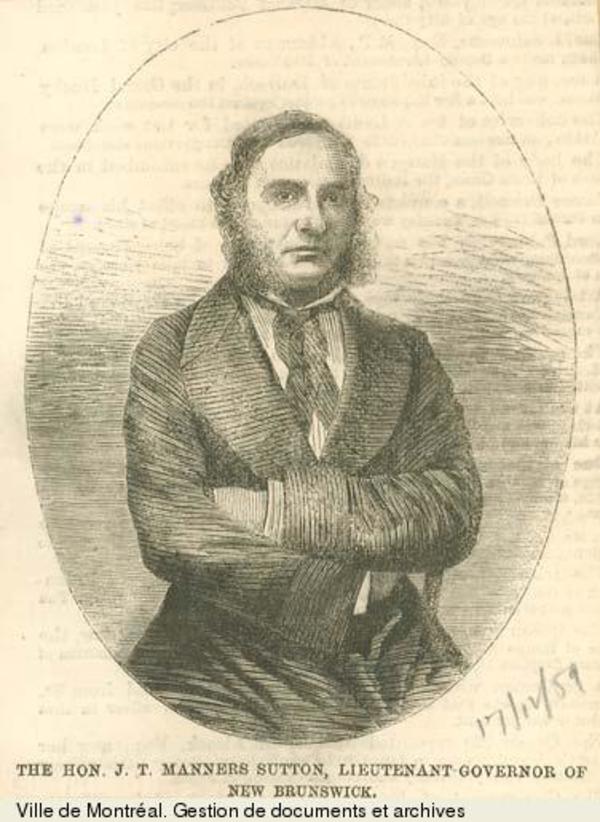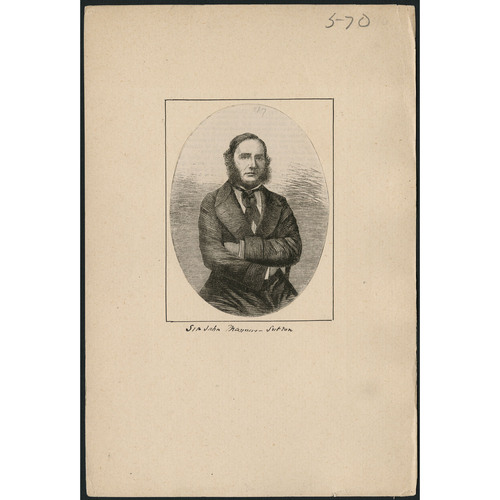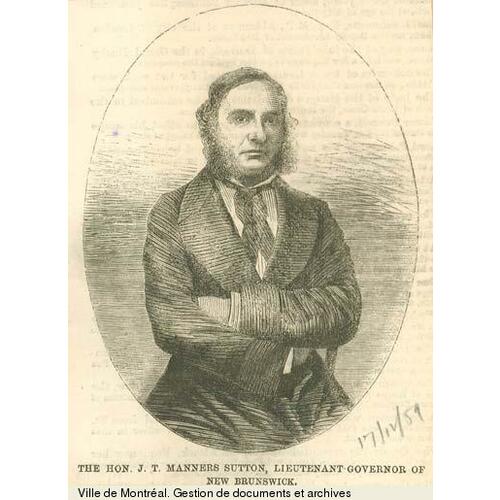
Source: Link
MANNERS-SUTTON, JOHN HENRY THOMAS, 3rd Viscount CANTERBURY, politician and colonial administrator; b. 27 May 1814 in London, Eng., son of Charles Manners-Sutton, 1st Viscount Canterbury, and Lucy Maria Charlotte Denison; d. 24 June 1877 in London.
John Henry Thomas Manners-Sutton was descended from a line of distinguished British Conservatives; his grandfather, Charles Manners-Sutton, had been archbishop of Canterbury; his great-uncle, Thomas Manners-Sutton, had served as lord chancellor of Ireland; his father was speaker of the British House of Commons for 18 years. He himself was educated at Eton and at Trinity College, Cambridge, where he received an ma in 1835; he entered Lincoln’s Inn in that year but was never called to the bar. On 5 July 1838 he married Georgiana Tompson by whom he had five sons and two daughters.
The political career of Manners-Sutton began somewhat falteringly in 1839 when he won a Cambridge by-election for the Tories but was subsequently unseated for bribery. He won the seat again in 1841 and in September was appointed under-secretary for the Home Department in Sir Robert Peel’s administration. He rarely took part in Commons debates and resigned his office when Peel was overthrown in 1846. Defeated in the 1847 election, Manners-Sutton retired from politics to devote much of his time to editing the Lexington Papers (8v., London, 1851) for publication.
On 1 July 1854 Manners-Sutton was appointed the eighth lieutenant governor of New Brunswick. According to W. S. MacNutt, he had been selected “by reason of a promising ability that had been displayed” at the Home Office and by reason of his family’s “important connections.” When he arrived to take up his post in October, a group of local politicians were concerned because responsible government had not become an accomplished fact and they believed Manners-Sutton had reservations on this score. On 20 Oct. 1854 the reform leader, Charles Fisher, introduced an amendment to the address in reply to the speech from the throne arguing that the government had “quailed” before the lieutenant governor, Sir Edmund Head*, in 1851, and that responsible government had, therefore, really not come in 1848 [see Wilmot]. Fisher also referred to rumours that Head had met his successor, Manners-Sutton, in Boston and told him how to run the Legislative Council and, through it, the colony. It was obvious that the new governor was not popular with the reform-minded members of the assembly. Eight days after Fisher’s speech, the government, led by John Ambrose Street*, lost a division in the assembly. “Shortly after,” as MacNutt has noted, “for the first time in New Brunswick history, a government resigned because of an adverse vote in the house of assembly.” Manners-Sutton then appointed Fisher attorney general, but in his dispatches to London the governor made no attempt to hide his distaste for the new government.
The main concern of the Colonial Office in 1854 was that the New Brunswick assembly pass the laws necessary for the success of the reciprocity treaty with the United States. A dispatch to Manners-Sutton in September expressed the hope that “the fruits of so much execution will not be thrown away.” The British government felt that the treaty would bring “the greatest advantages to Her Majesty’s North American subjects” but recognized that the colony had “the ultimate decision as to the deliberations of this legislation.” Manners-Sutton was authorized to make changes in colonial trade laws in compliance with the council and to bring the question of reciprocity “in the fullest and fairest manner before the provincial legislature.”
During the first year of his tenure, Manners-Sutton and the Colonial Office disagreed on several points. The governor was in favour of granting the title “honourable” to retiring members of the Legislative Council, but he was over-ruled by Sir George Grey at the Colonial Office who wrote to Sir Robert Peel that such a move threw “an invidious power into the hands of a Governor who has already for the most part sufficient danger of unpopularity.” In January 1855 both Grey and Peel opposed Manners-Sutton’s suggestion that New Brunswick’s civil list be placed in the hands of the Executive Council. Six months later he seemed to be on better terms with his superiors the legislature had made changes especially in the trade and fishing laws – a continued preoccupation of the imperial government.
Manners-Sutton’s next test came in 1855. The New Brunswick assembly had passed a bill in 1853 prohibiting the importation of alcoholic beverages into the colony. This measure could not be enforced effectively, but the temperance adherents, led by Samuel Leonard Tilley*, wanted a more stringent bill. In 1855 a second prohibition bill was passed, and, despite the governor’s objection, given royal assent. Manners-Sutton did, however, recommend to the Colonial Office in London that it disallow the bill, but the Colonial Office ignored the recommendation. After the controversial measure became law, Manners-Sutton advised his New Brunswick government either to enforce the law or to repeal it – advice intended to destroy Fisher’s government. The government’s failure to enforce the prohibition bill eventually forced its resignation, but a subsequent election saw most of the same men returned to the assembly. Many of those elected had changed their minds about prohibition during the campaign; they acknowledged the propriety of Manners-Sutton’s actions by repealing the measure.
During the remaining four years of his term, amidst a period of unprecedented prosperity in the province, the secret ballot was introduced, the power of the Legislative Council was reduced, and some assemblymen were pressing Manners-Sutton to open negotiations enabling the executive to initiate money grants. In 1857 the Colonial Office recognized the principle of responsible government in the colony by stating that any bill which did not receive “the assent of the three branches of the legislature must be regarded simply in the light of a ‘Dropped Bill.’ “ A prolonged controversy over government grants to King’s College, later the University of New Brunswick, aided Fisher and his supporters in their persistent demand that the legislature be given the right to supervise the drafting of confidential dispatches sent by Manners-Sutton to London. The Colonial Office supported Manners-Sutton’s right to give confidential and private advice but when word reached Fredericton that Sir Howard Douglas*, Bishop John Medley*, and Edward Barron Chandler all had called at the Colonial Office to make representations concerning King’s College, the New Brunswick government successfully demanded that copies of the documents should be made available for rebuttal. Yet another inroad had been made on the powers of the lieutenant governor.
Manners-Sutton had many other differences with Fisher, but they did agree on one issue: they chose to ignore a resolution passed in Canada in 1858 urging talks about the union of the British North American colonies. Manners-Sutton feared that imperial trade might be hampered by a union, and he also predicted that the Maritime provinces might resent the loss of their autonomy. He was in favour of Maritime union, however, and, in 1858, reported to London that talks on the subject would shortly begin between New Brunswick and Nova Scotia. The news was premature, for when Manners-Sutton was succeeded in October 1861 by Sir Arthur Hamilton Gordon* the movement for union of any kind seemed dormant.
From New Brunswick, Manners-Sutton went to Trinidad where he was governor for two years, long enought to witness the nearby Jamaica Rebellion and its bloody aftermath. His last colonial appointment, as governor of the Australian colony of Victoria in 1866, was the most tranquil and hence the happiest. That colony had undergone significant and, at times, stormy changes during the term of the previous governor, Sir Charles Henry Darling*. Manners-Sutton had no serious confrontations with the assembly during his seven-year term, and was one of Victoria’s most popular governors. He resigned in 1873 and returned to England to take his seat in the House of Lords, having become 3rd Viscount Canterbury on the death of his older brother.
Like many other British colonial administrators in the mid-19th century, Manners-Sutton was fighting a rearguard action against rising demands for local autonomy. His aristocratic upbringing and outlook contrasted sharply with the egalitarian and colonial mentality of men like Charles Fisher. Nevertheless, Manners-Sutton was able to work with these local politicians and to gain their grudging respect.
PRO, CO 188/118, 188/122–188/135. New Brunswick House of Assembly, Debates, 1854–61. DNB. R. M. Crawford, Australia (rev. ed., London, 1963). Hannay, History of New Brunswick, II. MacNutt, New Brunswick, 353–93. Geoffrey Serle, The golden age: a history of the colony of Victoria, 1851–1861 (Melbourne, Aust., 1963). E. E. Williams, History of the people of Trinidad and Tobago (London, 1964).
Cite This Article
Richard Wilbur, “MANNERS-SUTTON, JOHN HENRY THOMAS, 3rd Viscount CANTERBURY,” in Dictionary of Canadian Biography, vol. 10, University of Toronto/Université Laval, 2003–, accessed February 16, 2026, https://www.biographi.ca/en/bio/manners_sutton_john_henry_thomas_10E.html.
The citation above shows the format for footnotes and endnotes according to the Chicago manual of style (16th edition). Information to be used in other citation formats:
| Permalink: | https://www.biographi.ca/en/bio/manners_sutton_john_henry_thomas_10E.html |
| Author of Article: | Richard Wilbur |
| Title of Article: | MANNERS-SUTTON, JOHN HENRY THOMAS, 3rd Viscount CANTERBURY |
| Publication Name: | Dictionary of Canadian Biography, vol. 10 |
| Publisher: | University of Toronto/Université Laval |
| Year of publication: | 1972 |
| Year of revision: | 1972 |
| Access Date: | February 16, 2026 |




